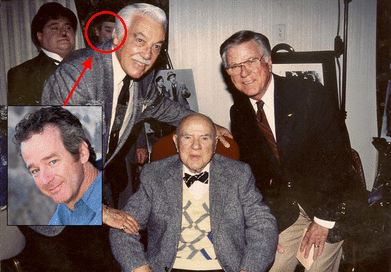
The concept came to mind earlier this month when, studying a photo from Hal Roach's 100th birthday party (discussed in my previous blog post), I became fixated on Laurel & Hardy imitators lurking in the background, partially obscured by Cesar Romero.
When I was at the event at Motion Picture & Television Country House and Hospital in Woodland Hills, Calif., back in January 1992, I thought their presence a bit surreal. Roach had worked with the real Stan Laurel and Oliver Hardy for decades, producing their films. They were close business associates, if not friends. Imagine having people dressing up as your dead grandparents at the next family reunion, aping their voices and mannerisms. It's a little different, sure, but not so much.
But a gig's a gig, and getting paid to mix with TV and film stars (including Charlton Heston, Dan Aykroyd and Robert Blake) at a party marking the centennial of the birth of a pioneering film producer is a pretty good one.
But who were those guys? I did a little googling and found they were Jeffrey Weissman (Laurel) and Bevis Faversham (Hardy). Checking Weissman's IMDB listing, I discovered he had also played George McFly in the "Back to the Future" sequels in 1989 and 1990, replacing original George Crispin Glover. After that, the roles quickly slowed to a trickle and didn't pick up again until 2000. I wanted to talk to Weissman and find out what happened after the credits rolled, so to speak.
Thanks once again to the internet, Weissman wasn't hard to find. When I got him on the phone, I discovered there was a lot more to his life and career, including frustrating near misses (the lead in 1983's "War Games"), interesting encounters with icons such as Iggy Pop and Dick Van Dyke and some serious repercussions to taking the role of George McFly that eventually drove him to leave Los Angeles.
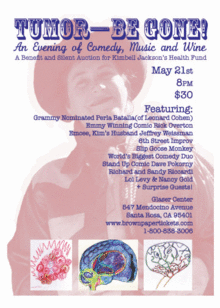
Jackson's current prognosis is good, but her treatment has left them with a mountain of medical bills. To help combat those, Weissman is hosting "Tumor -- Be Gone," a benefit tonight (Saturday, May 21st) at the Glaser Center in Santa Rosa featuring Emmy-winning comedian Rick Overton, Michael McShane (from the British version of "Whose Line Is It Anyway?") and Grammy-nominated chanteuse Perla Batalla.
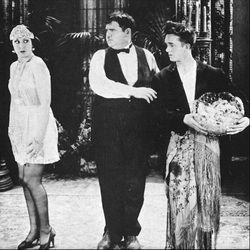 Anita Garvin with Laurel & Hardy.
Anita Garvin with Laurel & Hardy. Jeffrey Weissman: It was surreal, but it was really fun. Charlton Heston came up and said, "Hal... It's Chuck Heston. Remember me?" And Mr. Roach said, "Of course, I know who you are." The exact same words came out of Virginia Mayo's mouth Hal talked to us as if we were Laurel & Hardy, too.
Do you think he was doing that in a fun, self-aware way or was there some senile dementia involved?
Weissman: He was doing it more for fun, just going along with the role playing. He seemed to be very lucid and together. I had encounters with Lew Wasserman, who was a bit of a mogul, but Hal was from the period of real moguls, and that was pretty awesome.
I know your primary gig with Laurel & Hardy was at Universal Studios, which Wasserman ran for so many years, and the Motion Picture Fund [the nonprofit behind the Motion Picture Home] was the pet charity of his wife Edie. Would they bring you out to the home with Bevis to do Laurel & Hardy on a regular basis?
Weissman: Yes. Then I'd often go back out of character. One of the first times I went out there, they brought a little Dixieland jazz band, Laurel & Hardy and a few other characters. We were in the community room and they said, "We have a very special guest coming in to meet you, Stan," and they wheeled in this woman. The band was playing and she acted like she wanted to dance, so I started dancing with her, even though she was in a wheelchair. And, at one point, as Stanley, I spun out and started dancing with a new partner, and from behind me the woman in the wheelchair said [in a falsetto voice], "Stanley!" And I got shivers down my spine, because I hadn't realized until that moment that it was Anita Garvin, the silent film actress/comedienne who played Stanley's wife in many films. My heart melted. She was such a talent. I would go back out spend time with her and she would regale us with stories of doing the shoots and things. Those stories were pure gold, the real reward for meeting those folk and doing those gigs for Universal.
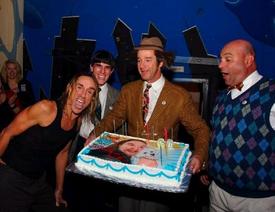 Weissman and fellow Stooges with Iggy Pop.
Weissman and fellow Stooges with Iggy Pop. Weissman: Yeah, it's heartbreaking. I did an event [in 2007] for Iggy Pop's 60th birthday as The Three Stooges team. We brought Iggy's 60th birthday cake out to him after a party in San Francisco. Because I was playing Larry Fine, [Ron Asheton, guitarist for Iggy's band The Stooges, who passed away in January 2009] cornered me and said, "I was Larry's best friend the last few years of his life. I'd go out to the Motion Picture Home and spend my weekends with Larry." He'd tell me these stories about his time with Larry and how he snuck him out of the Motion Picture Home for a Vegas weekend getaway with his secret girlfriend and how Larry's sister claimed that he killed him, because Larry died shortly after that trip to Vegas. But I was like, at least Larry had a good time until the end.
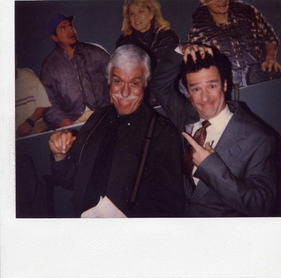 Weissman with Dick Van Dyke.
Weissman with Dick Van Dyke. Weissman: I had a small guest starring role on a "Diagnosis Murder" [in 2000] and sort of to break the ice, because I'd heard that Dick can sometimes be ornery, I brought an Alpaca sweater with the Dick Van Dyke label that I'd found in a thrift store back in the early '80s. I found Dick's assistant and I showed it to her. Later, Dick came out and found me and said, "Are you the guy with the sweater?" And I said, "Yeah." He said, "I had completely forgotten that I'd lent my name to these people back in 1961" or whenever it was, and that broke the ice. I talked to him about having played Stanley for 17 years at Universal and my exploits, and after that it was hard to get us on set because were sharing stories almost the entire day. He was really lovely.
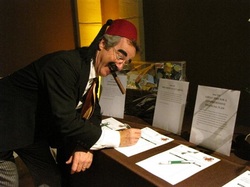 Weissman as Groucho Marx.
Weissman as Groucho Marx. Your primary gig was at Universal Studios?
Weissman: Yes. I was in character at least five days a week full-time for seventeen years. I also played Stanley in an Equity production of "Babes in Toyland" with Robert Morse. And we would also tour. For example, when there was a fire at Universal, the Vice President of Marketing sent Bevis and me to London to a big convention to tell everyone that the [studio] tour was still open. We did events in Denmark and Switzerland, and a several-weeks tour of Australia promoting the Universal tour. I also co-wrote a music and magic show for Laurel & Hardy, and Bevis and I took it on a cruise ship in the South China Sea. So Stanley's been very good to me.
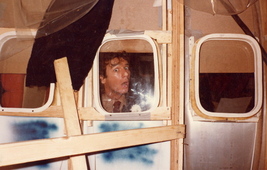 Weissman on the set of "Twilight Zone: The Movie."
Weissman on the set of "Twilight Zone: The Movie." Weissman: I was raised in L.A. and Hollywood and my folks were loosely associated with the entertainment industry. My dad had a private club [for bridge, backgammon, etc.] that Omar Sharif and Don Adams and all sorts of folk played at. He was business partners with Lorne Greene. But my folks never really wanted me to go into show biz. They didn't thwart me, but they didn't really support me that much. So I went out on my own to get training at ACT [the American Conservatory Theater] in San Francisco after doing some walk-on stuff in films like "The Rose" and "Sgt. Pepper's Lonely Heart's Club Band" in the late '70s.
When were you at ACT?
Weissman: In the early '80s… about the same time as Annette Bening. I was doing my intermediate studies and fell into an opportunity to screen test for "War Games" in '82. I tested with Ally Sheedy, and a very aggressive agent who had just come out of the William Morris Agency and started her own agency pursued me because [director] Martin Brest told me I was his favorite for the lead in "War Games." Unfortunately, Martin got fired, and the role went to Matthew Broderick.
Returning to Los Angeles from L.A., Weissman went on to land small roles in “Twilight Zone: The Movie” (1983), “Crackers” (1984), starring Donald Sutherland and Sean Penn, “Johnny Dangerously” (1984), starring Michael Keaton, and “Pale Rider” (1985), starring Clint Eastwood, as well as guest spots on such TV shows as “Dallas,” “Scarecrow and Mrs. King” and “Max Headroom.” But it wasn’t enough for him and his first wife to make ends meet.
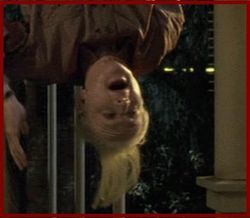 Weissman as George McFly.
Weissman as George McFly. Weissman: Ironically, the same agent that asked if I'd ever considered playing Stan Laurel called me up and asked if I knew who Crispin Glover was. I said, "Of course, I do." I did a film with Crispin at AFI the year before he did the first "Back to the Future" film. I thought he was a fascinating actor. I even got his number and tried to stay in touch. [The agent] said, "Do you think you're about the same height as him?" I said, "No, he's taller than me. What's this for? Does he need a photo double for the sequel to 'Back to the Future'?" He said, "Well, I'm not at liberty to say." I said, "This is pretty obvious. Let me go in there and see what I can do." They put me through an audition with casting director Mike Fenton's office, and then had me do makeup tests with [cinematographer] Dean Cundey and [director] Bob Zemeckis.
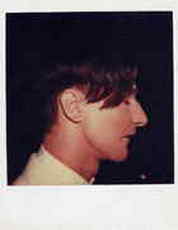
Weissman: As far as I knew, I was going to be a stand-in and photo double. I even called Crispin and said, "I don't know if you remember me. It's Jeffrey. I hope you'll put in a good word for me. I could use the work. My wife's going to have our second kid," etc. And he never called back until much later, when the third film was out and he was ready to sue them. I really didn't know until the Friday before we were to start shooting that I was going to be doing the role. They sort of kept it all under wraps. They couldn't work out their contractual agreements with Crispin, and it was the makeup guy who said, "Crispin's out. You're going to be playing George." And I was like, "You must be joking." They were pretty shrewd in their negotiations. They waited until after 5 p.m. on Friday to negotiate the contract. "Quick -- what's the lowest amount of money that you'll accept?" And I was like, "You must be joking. Hold out for some big money," which, unfortunately, they didn't. They were offering scale and I got them to double that at least.
It must've been intense with all the conflicting emotions.
Weissman: It was. The first day on set, when Michael J. Fox and I came face to face, he said, "Oh, Crispin ain't gonna like this." I was made up to look like Crispin as Young George. I couldn't help but feel like I was some kind of scab or something. It did feel like it was underhanded. But I also understand that [executive producer Steven] Spielberg, Zemeckis and Universal needed to have him and they saw him as an eccentric upstart. So my Libra nature is seeing both sides of the argument. Unfortunately, I was caught in the middle of it.
They had you in a bit of makeup.
Weissman: Just a bit. It took three and a half to four hours a day just to get into the makeup [including chin, nose and cheek prosthetics] and we had several days where my call would be 4 a.m. to get into the makeup so I was on set by 8 a.m., and we'd shoot for 20 hours or more and then I'd have six hours until I was called to makeup again. So there was some hard-working, long-houred weeks, but all in all it was a really exciting shoot to be a part of and in the long run the reward for me has been the fan base. I've had amazing attention from around the world because of those films. I've been invited to go to London in July to be at a Comic-Con with Christopher Lloyd and Leah Thompson. It's a really nice family. For example, I'm often a guest at the DeLorean owners club meetings. When they have their big events, I'll come out and entertain or emcee or run their auctions. They like me a lot, which I love.
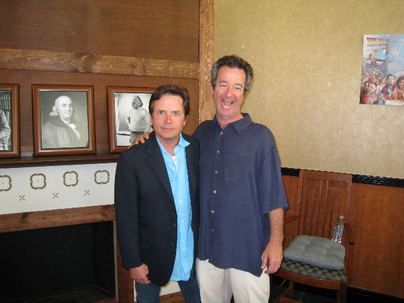 Weissman with Michael J. Fox at a "Back to the Future" 25th anniversary celebration.
Weissman with Michael J. Fox at a "Back to the Future" 25th anniversary celebration. Weissman: No. I like him, but his attorney used some pretty bad tactics and things that I sort of said in confidence and them out in public. I had a bad backlash from that.
For taking that role?
Weissman: No, for talking with Crispin. I had told Crispin that at one point while we were shooting, Spielberg came up to me -- not really talking to me, but just being a smart ass -- and said, "So, Crispin, I see you got your million dollars after all." That's when I knew what Crispin was holding out for. Crispin's attorney ended up talking about that and it got into Variety and The Reporter, and shortly thereafter my boss at Universal said, "Hey, what did you do wrong on 'Murder, She Wrote'?" I said, "I never worked on 'Murder, She Wrote.'" And he said, "Well, Angela Lansbury had worked with Laurel & Hardy and asked for Laurel & Hardy to be on this next episode, but not you." And I was like, "Uh... That's strange." And I was like, "Oh, shit." That didn't come from Angela, that came from the casting director.
Did your fellow actors ever say anything to you about putting on the makeup and doing the part?
Weissman: Most everyone just sort of rolled with it. They just wanted to work as did I. I haven't had too much response. It's ironic because a lot of the public don't know there was a different actor there. I'll go to events and mention my work in those films and a lot of people says, "No, that wasn't you" or "That was you?!" which means I did my job, I guess. But it was the producers’ objective to make it seamless or seem like it was the same actor. It's that gray area. Universal claimed they owned the character of George McFly. But Crispin's argument, which won, was "that's my likeness."
With the distance and perspective you have now, I imagine you enjoy going to the shows and being a part of it.
Weissman: I do. It's really all about the fans. When I walk into the room with people who know what I've done, there's a really nice glow. People are like, "Wow, I love those films, and you were a part of that." It's really special. There's no denying that.
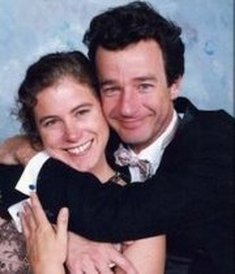 Weissman and wife Kimbell Jackson.
Weissman and wife Kimbell Jackson. JW: About three years ago, she started having pretty regular chronic migraines and was suffering terribly. They'd often be located behind the eye. She couldn't function. She had a very challenging job with opening a hospitality room for Joseph Phelps Vineyards new venture. We think her doctors through Kaiser misdiagnosed her. They went, “Oh, is it allergies? Is it x, y and z?” They finally diagnosed her with a seizure disorder, saying there was too much electrical flow in her head, and put her on all these medications. She was on like 11 different medications and was just overmedicated all the time. She got the project open and was set to be pretty much the main person running the hospitality room, but because she was so medicated and having a hard time dealing, they had her train an assistant and made him the new boss and finally let her go. Then, sure enough, a couple of months after her COBRA ran out last year, she on her own got herself weaned off the medications and started using biofeedback to get a handle on the migraines. She had over 180 migraines just in one year. Then last October on about the 20th, she had a fall. I came home and her chin was bruised. I said, "What happened?" and she had fallen. Shortly afterwards, she developed a withering of her left hand and arm and then a pirate drag on her left leg, ao I made her go in and get an MRI. First, we went to the emergency room and, after a seven and a half hour wait, they took an X-ray and said, "We can't find anything. Come back in a few days." And I said, "Forget this," and went and got her an MRI, which showed about five lesions in her brain that turned out to be tumors. We finally got an initial diagnosis of central nervous system lymphoma and then finally after two months got her medical coverage from the county with a high co-pay and got her a biopsy that confirmed it was lymphoma, then she started her chemo in mid-January. Here it is May, and the last MRI is showing no tumors.
Is that a common result? Is it usually that successful?
Weissman: I would love to say "yes," but I don't think so. It really is a good [result]. She's had a lot of support from friends and people around the world, really, who know her and me and who've been praying and supporting as they can.
(If you're outside of Northern California and unable to attend, you can still contribute to Kimbell's health fund via PayPal using the account [email protected]).
| | |
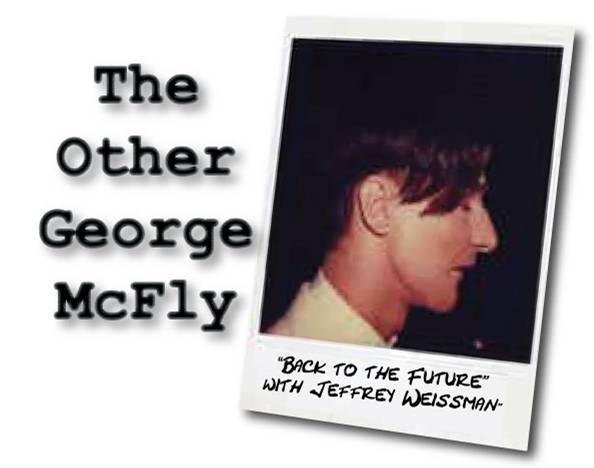
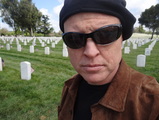
 RSS Feed
RSS Feed
